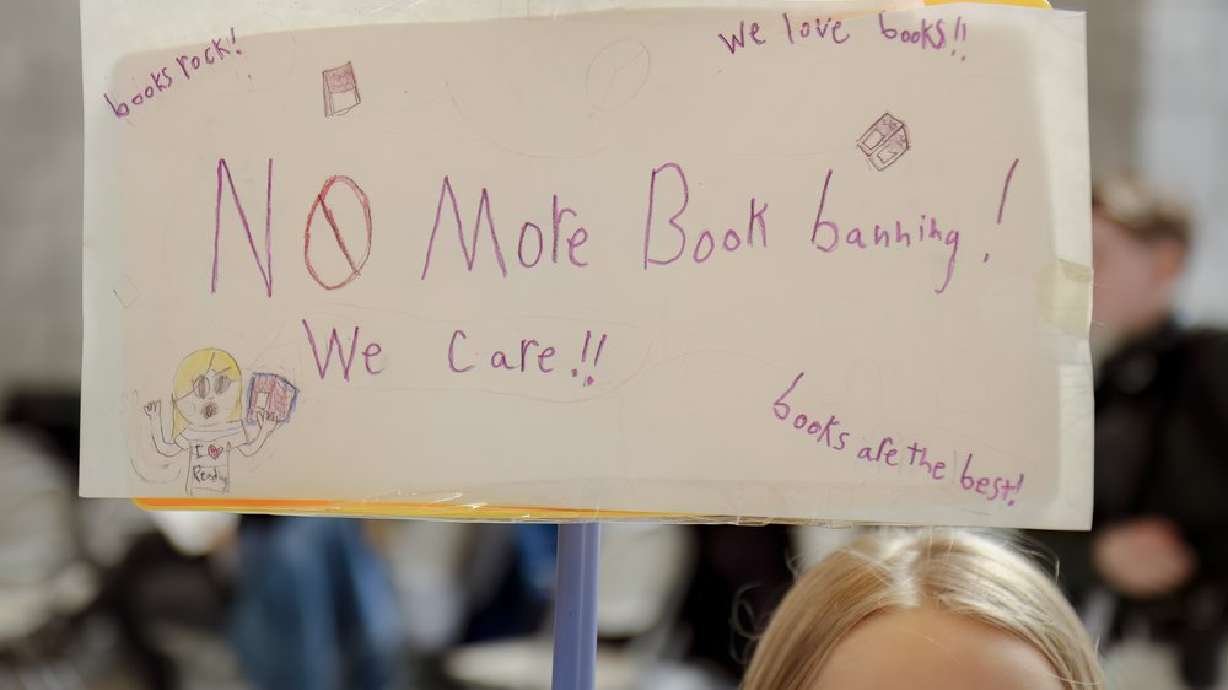Estimated read time: 4-5 minutes
This archived news story is available only for your personal, non-commercial use. Information in the story may be outdated or superseded by additional information. Reading or replaying the story in its archived form does not constitute a republication of the story.
SALT LAKE CITY — A coalition of Utah organizations on Tuesday sent a letter asking Utah Gov. Spencer Cox to veto the controversial HB29, which targets books and other material with sexually explicit passages for removal from school libraries.
Sponsored by Rep. Ken Ivory, R-West Jordan, the bill gives the State Board of Education the option of holding a hearing after three school districts or two school districts and five charter schools determine the materials in a book are pornographic or indecent, which would trigger removal of the materials statewide.
The House voted 52-18 last week to approve the compromise legislation, sending the bill to Cox for final consideration.
After holding a read-in at the Utah Capitol last week to advocate for the freedom to choose what to read and push back against legislation aimed at books, Let Utah Read joined the ACLU of Utah, the Utah Library Association, PEN Utah, EveryLibrary and the Utah Educational Library Media Association in calling on Cox to veto the bill.
The letter described the bill as "a looming threat to the vibrant tapestry of ideas that should adorn our educational landscape."
In Senate debate earlier this month, Sen. Todd Weiler, R-Woods Cross, said the legislation bans illicit pornography from being accessible in public school libraries.
"Illicit pornography is often graphic, X-rated descriptions or depictions of sexual acts that are designed to arouse and excite people. We're not trying to ban books simply because sexuality is mentioned or a sexual encounter is briefly described," Weiler said.
"It is time that we get behind protecting children in our schools, that it is a place of safety and decency for all children," Ivory said last month.
House and Senate Democrats have largely voiced opposition to HB29, particularly because of the triggers mandating removal of books from school libraries statewide. Those provisions, they say, take away local control.
The joint letter sent Tuesday raised concerns that if enacted, HB29 would stifle the voices of diverse authors and perspectives.
"Imagine a world where schools and libraries were purged and shelves once brimming with Nobel Prize-winning authors like Toni Morrison, Judy Blume, and Sherman Alexie were left empty, depriving future generations of the transformative power of their words," the letter reads.
Related:
Weiler pushed back against these notions, arguing that the legislation "is not an attempt to censor material for the sake of convenience or because the government disagrees with the materials' message. It does not ban any content because it explores racism, violence or alternative lifestyles or other controversial subject matters," he explained.
Critics of the legislation also argue that it leaves the decision of what happens to books statewide in the hands of a select few and that books are often only judged based on select passages instead of the entirety of the work.
In response to HB29, Rep. Brian King, D-Salt Lake City last week proposed HB583 with the hopes that it will "get across the point that it's important that we look at things (books) in their entirety," he said, describing it as a "counterweight to the kind of book banning bills that we see in the Utah state Legislature."
One component of the bill is that any challenged book has to be reviewed in its entirety, not just specific sections.
In 2022, the Utah Legislature approved the contentious HB374, which lawmakers described as a way to challenge and weed out content found to be pornographic from K-12 libraries and classrooms.
This led to challenges of the Bible, the Book of Mormon and the Quran in what appeared to be pushback against the legislation. Weiler called the challenges an attempt to make "a mockery" of the legislation.
The letter sent Tuesday went on, urging Cox to "let Utah read" by vetoing HB29 and not allowing "the shadows of censorship to darken the halls of our schools."
"At its heart, HB29 represents a dangerous encroachment on our fundamental freedoms. It seeks to muzzle the voices of dissent and erase the invaluable contributions of authors whose works have enriched the educational journey of countless students over the years. Let us not allow the shadows of censorship to darken the halls of our schools." Aaron Welcher, a spokesman for Let Utah Read and communications director for the ACLU of Utah, said in a statement.










